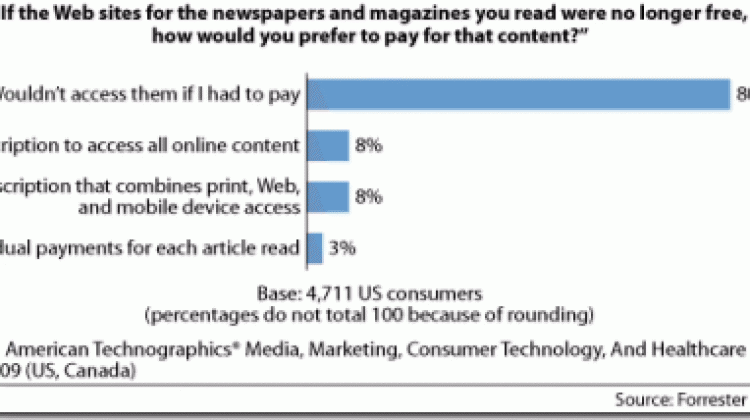Will Pay For Content Help The Media?
According to a new study just released, 80% of consumers would not be willing to pay for access to online content: A similar study was done by the Boston Consulting Group and found only 48% of the respondents would pay for online access to news, and the average monthly price they would be willing to […]

According to a new study just released, 80% of consumers would not be willing to pay for access to online content:
A similar study was done by the Boston Consulting Group and found only 48% of the respondents would pay for online access to news, and the average monthly price they would be willing to pay is only $3 per month.
So is “pay for content” the silver bullet the media is looking for? Going by these numbers, no it isn’t. A better cure for the media would be more openness – a willingness to work with bloggers to drive traffic to their sites.
Let’s examine the current model that the news organizations are looking at going to – a pay for content model. If that happens it will really drive down the viewership of their sites. Some bloggers will subscribe, but instead of copying and pasting in quoted text, they will now be forced to better editorialize the content. An example of that is above where I talked about the Boston Consulting Group’s report. That editorializes a New York Times’ article, and I was able to summarize two larger paragraphs into a single, short paragraph. That’s a decent time saver in today’s hefty world.
Since the New York Times’ isn’t doing a pay-per-content method yet, people can easily click on that link and read the article for themselves, finding out more information or even trying to fact check my editorial. With a pay-per-content model, that won’t be possible any longer. Also readers of this site won’t click on the link now because they know they have to pay.
Another issue with that comes up with this editorializing of content is fair use. While I could get in trouble for copying and pasting a bunch from the NYT’s article, nothing says I can’t editorialize like I did. As matter of fact I could editorialize it and not supply a link at all – perfectly legal. This does put a minor inconvenience on bloggers, as they would then have to actually write more than just copying and pasting, but the fact that people will be able to turn to the blogs and read a synopsis of something they may have to pay for, well that alone will turn into a big boom for the blogs.
 Let’s look at a larger blog like Daily Kos for a moment. They average almost 3/4 of a million visitors per day. Now think of how many visits a site like the New York Times would get if Daily Kos links them from the front page. Each of those visits translates into dollars from advertising. If the New York Times decides to lock the door by going with a pay-for-content model, then Daily Kos writers will have to start editorializing and then may no longer link. That’s why this model would end up costing the media more than it will generate.
Let’s look at a larger blog like Daily Kos for a moment. They average almost 3/4 of a million visitors per day. Now think of how many visits a site like the New York Times would get if Daily Kos links them from the front page. Each of those visits translates into dollars from advertising. If the New York Times decides to lock the door by going with a pay-for-content model, then Daily Kos writers will have to start editorializing and then may no longer link. That’s why this model would end up costing the media more than it will generate.
If the media embraced bloggers, let them quote text and link away following certain guidelines, then both the blogosphere and the media will be winners. The blogosphere can quickly copy and paste, along with supplying a link, and the media will see the rewards of being linked to by higher traffic blogs.
It’s time that the media stop listening to the ramblings of a crazy old man named Rupert and start examining what the real effects will be of a pay-for-content model will be. Going the route Rupert wants to go will be nothing short of suicide for an already dying media.







